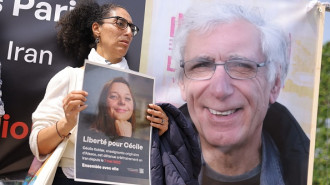US hails Yemen raid that killed civilians a 'success'
Sunday's raid - the first authorised by President Donald Trump - saw US special operations forces enter the Yakla region of Baida province and target a compound occupied by al-Qaeda in the Arabic Peninsula (AQAP) militants.
Washington views the al-Qaeda affiliate, known for plotting attacks in other countries, as the global terror network's most dangerous branch.
Navy SEAL Team Chief Special Warfare Operator William "Ryan" Owens, 36, was killed and three other US troops were wounded in a fierce gunfight.
Three more service members were injured when their tilt-rotor aircraft made a "hard landing." The $75 million MV-22 Osprey had to be destroyed in place to avoid having it fall into enemy hands.
And on Wednesday, the Pentagon acknowledged that several non-combatants, including children, had apparently been killed in the raid.
Civilian victims
A Yemeni provincial official had previously said 16 civilians were killed - eight women and eight children - but the Pentagon did not provide numbers.
Washington is also facing questions on whether an eight-year-old American girl died. Local sources say the girl was the daughter of senior al-Qaeda cleric and US citizen Anwar al-Awlaqi, who was killed in a 2011 US drone strike.
After previously saying the raid snagged an "unbelievable" amount of intelligence, White House spokesman Sean Spicer said on Thursday the raid had been successful.
"When you think of the loss of life throughout America and institutions and in terms of the world, in terms of what some of the individuals could have done, I think it is a successful operation by all standards," Spicer said.
But he added it was hard to talk of success when an American was killed, and praised the sailor's sacrifice. He made no mention of the civilian victims.
Spicer said the plan had been under consideration since November 7, and officials under the administration of Barack Obama reviewed and approved it on January 6, but did not proceed because they were waiting for a moonless night - the next one wouldn't be until after Obama had left office.
The US raid was said to have targeted the houses of three tribal chiefs linked to al-Qaeda and a Yemeni official said Apache gunships also hit a school, a mosque and a medical facility all used by al-Qaeda militants.
The New York Times reported on Thursday that AQAP fighters may have known an attack was coming, possibly by increased drone activity in the skies.
Firefight
Pentagon spokesman Navy Captain Jeff Davis said the militants had engaged US forces in a firefight and, to the commandos' surprise, several women picked up weapons and started firing too.
"It was a situation that resulted in our forces... (needing) to call in aerial gunfire support," he said.
Trump, who has vowed to fight Islamic extremism relentlessly, on Wednesday traveled to an air base in Delaware to receive Owens' body.
Human Rights Watch said the United States should compensate the families of those "wrongfully" killed or wounded in the raid.
The conflict in Yemen escalated two years ago when a Saudi-led Arab coalition launched air raids against Iran-backed Houthi rebels, who had taken over the capital and seized swathes of the country's centre and north.
![Coalition airstrikes on Yemen [AFP] Coalition airstrikes on Yemen [AFP]](/sites/default/files/styles/large_16_9/public/media/images/02144B02-F46A-4350-8C12-9E257297B744.jpg?h=d1cb525d&itok=e6ofLm9e)




 Follow the Middle East's top stories in English at The New Arab on Google News
Follow the Middle East's top stories in English at The New Arab on Google News

![The law could be enforced against teachers without prior notice [Getty]](/sites/default/files/styles/image_330x185/public/2178740715.jpeg?h=a5f2f23a&itok=xMdFOAIF)
